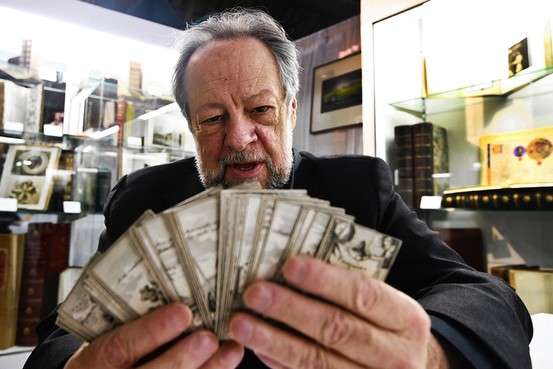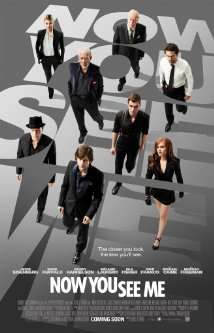 A master talks about, but does not reveal, his many tricks
A master talks about, but does not reveal, his many tricksRicky Jay, star and subject of this documentary,
Deceptive Practice: The Mysteries and Mentors of Ricky Jay, is a renowned magician, card manipulator, and slight-of-hand performer as well as a writer, collector, curator, and authority on the history of these arts and other arcane matters. This little first-person documentary (he is the face most on screen, and everything is as he tells it, or not at all) is about magic, his long career in it (he began serious study of the art at seven and appeared on TV as a magician at 15), and the men he learned from. This is an occupation whose practitioners were more renowned and revered in the past, in the time of, say, Harry Houdini. It seems a little seedy now; perhaps it always was. Learning the trade in the Seventies in Los Angeles, the Brooklyn-raised Richard Jay Potash (his real name) saw some older practitioners starving to death. But Ricky Jay's admirers and friends include David Mamet and Paul Thomas Anderson, both of whom have used him in their movies. In Mamet's debut film,
House of Games, Jay plays a card shark at a poker game who knows all. Mamet has also produced and directed three of Jay's touring shows. Jay is in Anderson's
Boogie Nights and
Magnolia and Christopher Nolan's
The Prestige. He has toured as "Ricky Jay and His 52 Assistants," they being, of course, the cards in a deck, and he is happiest sitting for hours and hours in front of a triple mirror shuffling and cutting and manipulating cards till gestures and tricks become pure instinct, the zen of card prestidigitation. This documentary is in the nature of a memoir. Do not expect any of the tricks to be explained. As in a magic show, we get to see and know what he wants us to. "Deceptive practice" in the title might suggest the film will reveal the deceptions, but Ricky Jay isn't about to do that. He shares his pleasure, not his secrets.
He does refer to some of the basic elements of magic, like distraction. He gives a classic example of a magician who had a woman assistant come on stage completely nude. Needless to say, he had no trouble making his rabbit or his pigeon or whatever it was appear by surprise after that. But everybody knows about the value of distraction. How he makes cards fly up into the air and boomerang back into his hands, or flips them across a room and makes them stick into a watermelon, or how you make those aces come up at will after many shuffles and cuts of a deck, those things he does not tell. Practice, practice, practice, we must guess. And in a man who began with magic at the age of four, and learned it first from his grandfather, Max Katz, a gifted amateur, a passion for magic clearly was deeply inbred. Ricky Jay loves what he does -- though not his family; he left his parents when he was very young and remained cut off from them ever after. His mentors of necessity became his de facto family, he admits. He may not have had true love in his life -- love of humans, not love of a fresh deck of cards or a mentor -- till recently, but it's nice to see that not long ago a woman did come along, and we see them happily together, though he does not identify her.
He is also a collector, and 1996 TV film, with the title
Ricky Jay and His 52 Assistants, delves deeper into the collection as well as covering one of his shows. Here we get glimpses of many title pages and colorful illustrations of some very old manuals about the art of magic. Ricky has studied these, he makes clear, and learned from some of the oldest ones; this is an ancient art, and one that may not have changed very much, its heyday perhaps the nineteenth century. But he explains that the best way to learn is to attach oneself to an older master, and he describes the two most important ones in his life, Dai Vernon and Charlie Miller, in detail. There's enough archival footage of both for them to come thoroughly to life. It becomes clear that this is a fraternity as cagey as it is ancient. Sharing of secrets only comes with long association and loyalty. Other colorful greats of previous generations also get descriptions from Ricky, including Al Flosso, Slydini, and The Great Cardini. These men had lived in the day of vaudeville, whereby they could make a good living traveling around and just doing a few minutes of performing in each place. The Ed Sullivan Show was a TV survival of that kind of entertainment.
It's different for Ricky Jay. Obviously from the all-too-brief excerpts from performances (over four decades) he is a witty and amusing narrator of his own tricks able to draw gasps and sobs from even the most sophisticated audiences. But the trouble with magic in movies or movies about magic is that tricks lose their magic on the screen. This was the flaw, among others, of Louis Leterrier's jazzy and wholly disappointing new film,
Now You See Me, about a group of magicians who join up to pull off a big heist. Especially in these post-CGI days, anything can be faked on a computer, so you have to see a magic act live in front of you. The flasher
Now You See Me gets, the less it all matters, and it wastes eight or ten well-known actors. Ultimately the best thing about it is its snappy poster.

The smart filmmakers know that magic is delicate and artisanal, and functions best in intimate settings. But we cannot fully enjoy the magic of Ricky Jay's magic shows, though we can see he's a great manipulator of cards, a magician of tremendous experience, and an enthusiast with profound knowledge of the game. Oh, they're great tricks, if you like that kind of thing (it's mostly making stuff appear and disappear), but you'd really have to be in the room to enjoy it fully.
When he's not touring or acting in films or curating or writing or talking about his collections or happily sitting and shuffling the deck, Ricky is an adviser and runs a consulting company, also called "Deceptive Practices," which supplies "arcane knowledge on a need to know basis" for various films, including
Forrest Gump,
The Illusionist, and
Oceans 13.
Deceptive Practice: The Mysteries and Mentors of Ricky Jay, 88 mins., a decade in the making, debuted as a sidebar item at the NYFF Oct. 4, 2012. It's US theatrical release from Kino Lorber at Film Forum in NYC was April 17, 2013. It opens June 28, 2013 in the San Francisco Bay Area in California at Opera Plaza, San Francisco; Landmark Shattuck Cinemas, Berkeley; and Camera 3, San Jose.





